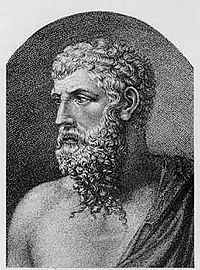Main Page: Difference between revisions
No edit summary |
No edit summary |
||
| Line 10: | Line 10: | ||
---- | ---- | ||
<!-- PASTE INCIDENT BELOW. --> | <!-- PASTE INCIDENT BELOW. --> | ||
=== ''' | === '''Artist:''' Aristophanes === | ||
====Date: [[:Category: | ====Date: c. [[:Category:448 B.C.|448]]-[[:Category:380 B.C.|380]] B.C.==== | ||
====Region: [[:Category:North America|North America]]==== | ====Region: [[:Category:Europe|Europe]], [[:Category:North America|North America]]==== | ||
====Subject: | ====Subject: [[:Category:Political/Economic/Social Opinion|Political/Economic/Social Opinion]], [[:Category:Explicit Sexuality|Explicit Sexuality]]==== | ||
====Medium: [[:Category: | ====Medium: [[:Category:Theater|Theater]], [[:Category:Performance Art|Performance Art]], [[:Category:Literature|Literature]]==== | ||
---- | ---- | ||
[[File: | [[File:Aristoph.jpg|right|200px]] | ||
'''Confronting Bodies:''' | '''Confronting Bodies:''' Plutarch, United States customs, Nazi occupation authorities, Greek military | ||
'''Dates of Action:''' | '''Dates of Action:''' A.D. 66, 1942, 1954, 1967 | ||
'''Location:''' The | '''Location:''' Greece, United States | ||
'''Description of Artwork:''' ''The Clouds'' 423 B.C.: Comedy, an attack on the 'modern' education and morals as imported and taught by Sophists. in this play Socrates and his pupils are ridiculed, and at the end of it, their school, the Phrontisterion (thinking school) is burned to the ground. Socrates is pilloried as a typical representative of impious and destructive speculations. | |||
''The Birds'' 414 B.C.: Comedy of fantasy. Some scholars see it as a political satire on the imperialistic dreams that had led the Athenians to undertake their ill-starred expedition of 415 B.C. against Syracuse Sicily. | |||
''[[Lysistrata]]'' 411 B.C. Play depicting the seizure of Acropolis and of the treasury of Athens. | |||
'''The Incident:''' A.D. 66 His comedies were considered obscene by Plutarch | |||
1930 United States : Customs ban lifted on ''[[Lysistrata]]''. During the period of prohibition the book was published and sold for as little as thirty-five cents; and the drama was played in New York and Philadelphia as adapted by Gilbert Seldes. | |||
1942 Athens, Greece : performance of classic Greek plays banned by Nazi occupation authorities. | |||
1954 United States : Post Office officials seized a copy of the 1926 translation of ''[[Lysistrata]]'', by Jack Lindsay, addressed by Fanfrolico Press, England, to Harry A. Levinson, Beverly Hills bookseller. The Post Office quickly reversed itself and delivered the book, but only because it was "not for general distribution". | |||
1967 Athens, Greece : The military clique then ruling the country banned a number of classic plays, including those named above, presumably because of their independent and antiwar themes. | |||
'''Results of Incident:''' 1955 United States : In a successful challenge of the Comstock Act of 1873 which empowered the Postmaster General to rule on obscenity of literature sent through the mail, ''[[Lysistrata]]'' was declared mailable. | |||
'''Source:''' Banned Books 387 B.C. to 1978 A.D., by Anne Lyon Haight, and Chandler B. Grannis, R.R. Bowker Co, 1978. | |||
[[Category:66]] | |||
[[Category:60s]] | |||
[[Category:1st century]] | |||
[[Category:1942]] | |||
[[Category:1940s]] | |||
[[Category:1954]] | |||
[[Category:1950s]] | |||
[[Category:1967]] | |||
[[Category:1960s]] | |||
[[Category:20th century]] | |||
[[Category:Europe]] | |||
[[Category:Greece]] | |||
[[Category:Athens]] | |||
[[Category:North America]] | |||
[[Category:United States]] | |||
[[Category:Political/Economic/Social Opinion]] | |||
[[Category:Explicit Sexuality]] | |||
[[Category:Theater]] | |||
[[Category:Performance Art]] | |||
[[Category:Literature]] | |||
[[Category:Aristophanes]] | |||
__NOTOC__ | |||
<!-- END FEATURED CASE --> | <!-- END FEATURED CASE --> | ||
Revision as of 16:46, 13 February 2017
|
